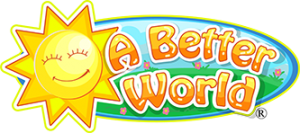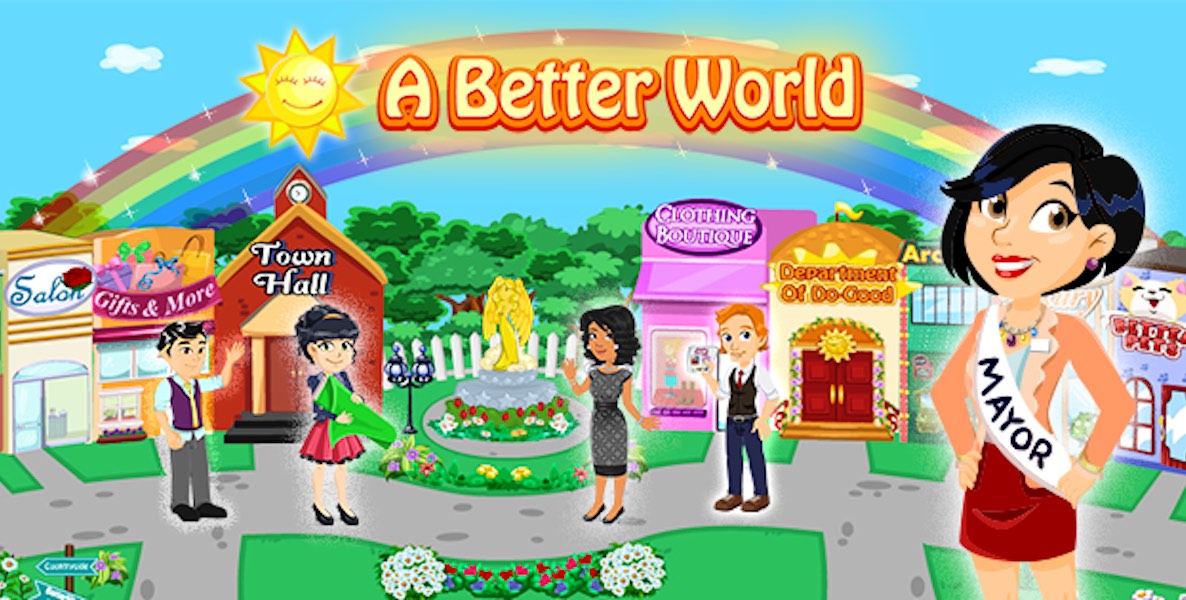What if you could greet a new neighbor, check in on a friend, pet your dog, note what you’re grateful for, write down your dreams, say a prayer for a sick family member, redecorate your house and recycle—all while sitting at your desk? Oh, and what if by doing all of that, you also are contributing to charity—and scoring points?
You could—if you played A Better World, a Facebook game started by Wayne entrepreneurs, MarySue, Ray and Gregory Hansell. The game, played by 4 million people in 100 countries, is a twist on two phenomena—gaming and social media. In A Better World, players advance through doing good and helping others, either through expressing gratitude and doing virtual good deeds or through recording good deeds they’ve done in real life.
![]() When the gaming community has earned enough virtual points, the Hansells reward the actual world with a donation to charity. So far, the family has given over $50,000 to over 20 charitable organizations, both international and local.
When the gaming community has earned enough virtual points, the Hansells reward the actual world with a donation to charity. So far, the family has given over $50,000 to over 20 charitable organizations, both international and local.
The Hansells call this “cause gaming,” a concept reflected in the game’s motto: “Where all good deeds are rewarded, and real world causes are supported.”
MarySue and Ray Hansell were successful entrepreneurs for years, with a consulting firm, and an international marketing and customer support call center that employed thousands of Philadelphia-region employees. Hansell says he was not particularly charity-minded. But after 20 years of running businesses in the area, he had started looking for a way to give back.
In 2009, their son Gregory was ready to join the family business. He had a strong background in philosophy and religion, and had worked in several think tanks that served the public good. He was also a techie, and in the fall of that year talked Ray into going to San Francisco for a technology conference.
The game, played by 4 million people in 100 countries, is a twist on two phenomena—gaming and social media. In A Better World, players advance through doing good and helping others, either through expressing gratitude and doing virtual good deeds or through recording good deeds they’ve done in real life.
Father and son saw the “amazing explosion of casual social games,” Ray Hansell says. They came back intrigued by the possibilities these kinds of games might offer and recognized an untapped opportunity. Many say the rise of social networks has made today’s youth ever more isolated and selfish. The Hansells, though, saw Facebook as a tool that could bring people together, that has within it “an inherent altruism” that no one had used before. They wanted to make a game that would do good.
In A Better World, players choose an avatar for themselves, move into a virtual house and then go about the virtual neighborhood doing good deeds, connecting with others, and investing in their homes. They earn “Do-Good Gold” every time they report doing a good deed, either in the game or in real life—everything from helping others to expressing gratitude, recycling or donating to a good cause.
“It was important to us that players weren’t just doing good behind a screen,” says Hansell. “We wanted to cross that ‘virtual-actual’ divide and have players doing good in real life as well as in the virtual world.”
The game challenges players to perform acts of kindness in the real world, and then earn points by sharing that in-game with pictures and posts. In their virtual neighborhood, meanwhile, players can impact the real world in an area called “Positive Post,” which lets them send actual “Get Well” cards to kids recovering from surgeries through the nonprofit Cure International.
To date, players of A Better World have performed 40 million good deeds, both virtual and real.
“Unlike other video games, it’s not violent, it’s not about slaying the dragon,” says Hansell. “It’s about encouraging generosity, gratitude, and kindness.”
“It’s fitting that this game started in Philadelphia,” Hansell says, “because it emanates from our history as the City of Brotherly Love. To harness the power of technology and its innate ability to do random acts of kindness out there in the world, that’s a Philadelphia idea.”
Each month the Hansells pick a charity, and the charity names a number that would allow it to move forward on a substantive initiative. If players of A Better World collectively do a predetermined number of good deeds, the charity receives the sizable donation they asked for. A Better World collaborates both with big national charities like CURE International and local Philadelphia-area charities like the Vetri Community Partnership, which provides fresh school lunches for kids in under-resourced areas, and Operation Warm, which distributes new coats to children during the winter.
This month’s charity is Emily’s Entourage, which is looking for a cure for Cystic Fibrosis; if players do 250,000 good deeds in May, the Hansells will donate $1,000 to the cause. Players can see the total progress towards the monthly goal, which encourages them to keep working hard to meet it.
A Better World is free to users—who tend to be women age 13 to 65, Hansell reports—but as they play the game, become more invested, and want to change their avatar or home community, that costs real life dollars. The game, like most other Facebook games, is funded on this model as well as through advertising. The Hansells, who will not say how much money they have made with the game, use these upgrade fees to fund A Better World’s charitable giving.
The success of the Facebook game led the Hansells to launch a version of A Better World for younger children, to play on a tablet.They also host a weekly interview program called BetterWorldians Radio, available to stream, where they profile innovators doing work in line with the mission of A Better World, like author and CEO of World Relief, Stephen Bauman, and Denise Day, CEO of the YMCA of Greater Brandywine.
Like their game, the Hansells have created a company that is a bridge, a “social enterprise” that pairs doing well financially with doing good in the world. They aim to create a better business world, as well, with the belief that “companies can turn a profit while making a difference.”
Hansell says he’s received thousands of thank you messages from families all over the world who appreciate the message of the game, particularly from parents who enjoy playing the game with their kids. Next for A Better World is expanding internationally, into other languages, like Spanish, French and Portuguese.
“It’s fitting that this game started in Philadelphia,” Hansell says, “because it emanates from our history as the City of Brotherly Love. To harness the power of technology and its innate ability to do random acts of kindness out there in the world, that’s a Philadelphia idea.”
A previous version of this story implied A Better World could be played on a phone; it is only a desktop game. It also misstated where to find BetterWorldians Radio; it streams here.
Photo Header: Courtesy of A Better World







